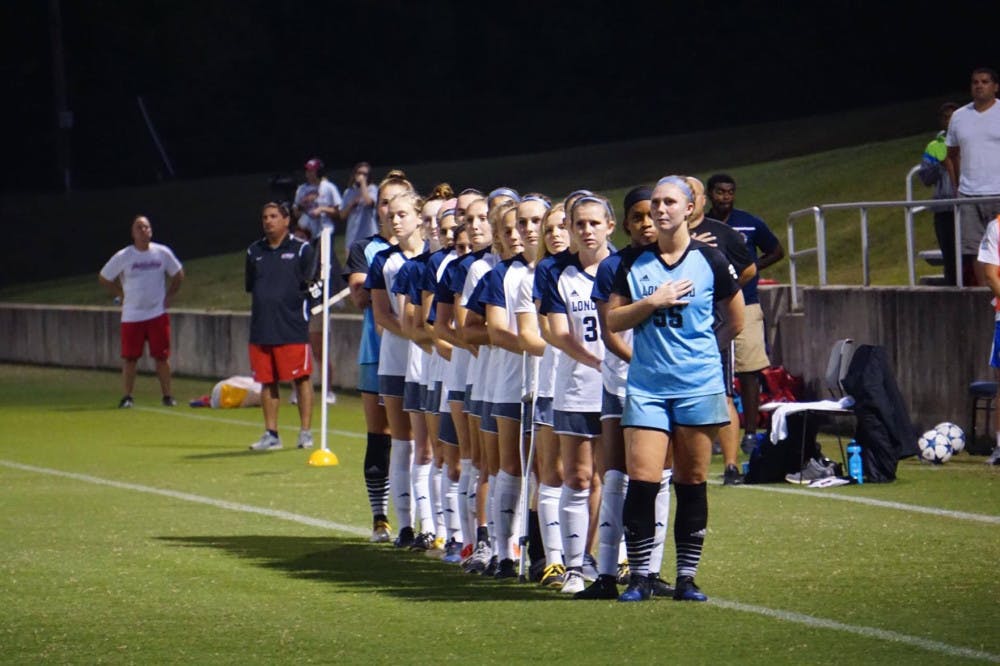Amid ongoing controversy surrounding protests during the national anthem in the NFL, Longwood University chose to permit any similar demonstrations by student-athletes, according to Director of Athletics Troy Austin.
While Longwood President W. Taylor Reveley IV hasn’t issued a public statement regarding the protests, Austin said he has met with Reveley and Vice President of Student Affairs Dr. Tim Pierson to discuss the issues internally.
"It’s not an area we take lightly because it affects so many people, our student-athletes and our constituents,” said Austin.
Their discussions concluded student-athletes can demonstrate freely, as long as they know what they are protesting and are aware of any criticisms they may receive.
“The ability to protest is an area of free speech, and we won’t limit that right,” said Austin. “But we also know this is an environment of higher education, so if you plan to protest, understand what you’re doing, why you’re doing it, what the repercussions could be and what other opportunities you may have to deliver your message.”

Austin said he reached out to other Big South institutions on how they’re handling the issue, saying they all are approaching it differently depending on their situations.
In August 2016, former San Francisco 49ers quarterback Colin Kaepernick sat down during the national anthem before a preseason game to protest against racial injustice and police brutality. After a former US Army Green Beret Nate Boyer met with Kaepernick to discuss his concerns, instead of sitting, Kaepernick took a knee during the national anthem before his first regular season game to mirror the way a soldier kneels before a fallen soldier’s grave.
In a campaign rally for Alabama Republican Senator Luther Strange on Sept. 22, President Donald Trump called on NFL owners to fire players for kneeling for the national anthem.
He said, “Wouldn’t you love to see one of these NFL owners, when somebody disrespects our flag, to say, ‘Get that son of a bitch off the field right now?’ Out. He’s Fired!”
On Sept. 23, the president followed up on his comments by denouncing Kaepernick’s protest on Twitter, calling further attention to the issue, resulting in players and owners around the league to drop to one knee before and during the national anthem in support of their right to free speech.
More players around the NFL joined the protest. They even prompted teams, including the Pittsburgh Steelers and Seattle Seahawks, to stay in their locker rooms for the duration of the anthem.
His comments caused many professional athletes around the sports world to speak out against Trump’s remarks, including NBA star LeBron James.


“For him to use this platform to divide us even more is not something I can stand for and not something I can be quiet about,” James said on Uninterrupted, a podcast and video outlet for professional athletes.
Though the protests during the national anthem at professional sporting events garnered more attention, Austin compared them to the average pregame routine.
“Everyone has set up pregame routines, and while this is a more volatile issue, it’s no different,” said Austin. “Like any type of pregame warm-up, it’s pretty ritualized.”
Austin said he urged teams at Longwood to have conversations about this subject, saying it could become a distraction if people are not in agreement. He specifically pointed to programs with a larger platform, such as the men’s basketball team.
The men’s basketball team carefully considered both sides and discussed as a team the issues regarding the protests during the national anthem, according to redshirt junior guard Bryan Gee.
“We sat down as a team and kind of tried to figure out what we were going to decide to do and didn’t want anybody raising their fist or kneeling without talking about it first. We wanted to all be a team about it.” Gee said.
After some discussion, Gee said they decided it was in their best interest to not demonstrate any protests during the national anthem this season.
“I feel like our men’s basketball brand doesn’t have a true foundation yet, and we all as a team collectively felt like that type of attention just wasn’t necessary to bring towards ourselves,” said Gee.
Austin said he encouraged teams to collectively make decisions on any potential protests during the national anthem. Though teams as a whole conducted the conversations, he said individuals are still permitted to demonstrate themselves.
Even though it is unlikely protests will be held, Gee said he believed the discussions helped better understand the issue and viewpoints from opposite sides.
Gee said, “No side is perfect. I think all humans can learn from one another.”
New Orleans Saints quarterback Drew Brees (9) kneels down with teammates before the U.S. national anthem was played ahead of an NFL football game against Miami Dolphins at Wembley Stadium in London, Oct. 1, 2017.
The Cleveland Browns team stand and kneel during the National Anthem before the start of their game against the Indianapolis Colts at Lucas Oil Stadium, Sept. 24, 2017.










